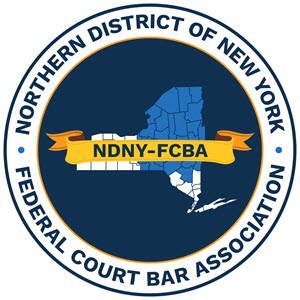By Evan Levesque, J.D. Candidate (Class of 2023), Albany Law School
*This article is an outgrowth of an FCBA-sponsored CLE, led by Girvin Ferlazzo partner Daniel Rubin in December 2021, that focused on the status of marijuana under state and federal law.
The legal status of cannabis has undergone significant change in recent years. Over the past decade, 18 states, as well as the District of Columbia, have legalized recreational cannabis use in some capacity. Michael Hartman, Cannabis Overview, Nat’l Conf. of State Legis. (July 6, 2021), https://www.ncsl.org/research/civil-and-criminal-justice/marijuana-overview.aspx. Among those states is New York, which enacted the Marijuana Regulation and Taxation Act (“MRTA”) in early 2021. In many of these states, thriving cannabis industries have emerged, and many of these industries are seeking legal representation. Yet, cannabis remains illegal under federal law. What does this mean for practicing attorneys? The reality is that we don’t know, and attorneys who take on these representations face the risk of substantial legal changes, many of which could significantly affect the attorney-client relationship. This article offers four steps that attorneys can take to help them navigate this significant change in the legal landscape.
First, attorneys must bear in mind that cannabis use, distribution and cultivation remain illegal under the federal Controlled Substances Act, 21 U.S.C. § 801 et seq. Therefore, counsel may want to, in their engagement letter, state the current status of cannabis under federal law and explain the legal consequences the client might face in cultivating or distributing marijuana.
Second, attorneys may choose to limit their engagement to state law matters only. In New York, this could mean including a disclaimer in the letter of engagement stating that the representation is limited to advice concerning cannabis growth, distribution, or use in New York State. In conducting the representation, of course, attorneys should ensure that their clients remain in compliance with the MRTA or other applicable state law.
Third, attorneys should be mindful of the federal government’s stated cannabis enforcement priorities. The most recent guidance provided by the Department of Justice is contained in Attorney General Jeff Sessions’ memorandum of January 4, 2018. Jefferson B. Sessions, Att’y Gen., Memorandum for All United States Attorneys: Marijuana Enforcement (Jan. 4, 2018), https://www.justice.gov/opa/press-release/file/1022196/download. This memo states that federal prosecutors, in deciding whether to prosecute cannabis-related crimes, should consider several factors, including federal law enforcement priorities set by the Attorney General, the seriousness of the crime, the deterrent effect of criminal prosecution, and the cumulative impact of particular crimes on the community. Id. Attorneys therefore may want to consider local conditions in deciding whether to represent a cannabis-related client. Areas with a high prevalence of cannabis-related crime may carry a greater risk of prosecution under the Controlled Substances Act. Attorneys should also be aware of any law enforcement priorities set by the Department of Justice. Some examples of past federal law enforcement priorities include: preventing the distribution of cannabis to minors; preventing revenue from the sale of cannabis from going to criminal enterprises, gangs, and cartels; preventing the diversion of marijuana from states where it is legal in some form to other states; preventing state-authorized marijuana activity from being used as a cover or pretext for the trafficking of other illegal drugs or other illegal activity; preventing violence and the use of firearms in the cultivation and distribution of marijuana; preventing drugged driving and the exacerbation of other adverse health consequences associated with marijuana use; preventing the growing of marijuana on public lands and the attendant public safety and environmental dangers posed by marijuana production on public lands; and preventing marijuana possession or use on federal property. James M. Cole, Deputy Att’y Gen., Memorandum for All United States Attorneys: Guidance Regarding Marijuana Enforcement (Aug. 29, 2013), https://www.justice.gov/iso/opa/resources/3052013829132756857467.pdf; see also David W. Ogden, Deputy Att’y Gen., Memorandum for Selected United States Attorneys: Investigations and Prosecutions in States Authorizing the Medical Use of Marijuana (Oct. 19, 2009), https://www.justice.gov/sites/default/files/opa/legacy/2009/10/19/medical-marijuana.pdf. The Department of Justice has also emphasized the need to comply with federal money laundering statutes, unlicensed money transmitter statutes, and the Bank Secrecy Act. See Sessions, Memorandum. Attorneys who believe that their representation will potentially involve, affect, and/or undermine one or more of these priorities may want to proceed with special caution, as compliance with state law will not immunize a client from prosecution under the Controlled Substances Act.
Fourth, attorneys should keep abreast of changes in the federal government’s position toward cannabis. Already, Attorney General Merrick Garland has suggested that the prosecution of low-level marijuana possession might no longer be an effective use of federal law enforcement resources. See Sarah N. Lynch & Doina Chiacu, Key Quotes from U.S. Attorney General Nominee Garland on Criminal Justice Policies, Reuters (Feb. 22, 2021), https://www.reuters.com/article/us-usa-senate-garland-hearing-quotes/key-quotes-from-u-s-attorney-general-nominee-garland-on-criminal-justice-policies-idUSKBN2AM2HT. Absent federal legislative action, future Attorneys General may either take a stricter or a more lenient stance on cannabis cultivation. Therefore, cautious attorneys may consider whether to provide a disclaimer in their letter of engagement allowing them to withdraw from the representation in the event of a significant and adverse change in federal law enforcement priorities.
Taking these steps may help minimize conflicts between attorneys’ ethical obligations to comply with federal law and to zealously advocate for their clients, while allowing cannabis-related businesses to receive effective legal representation. Attorneys should, as always, keep abreast of any changes in applicable statutory or regulatory regimes, especially given the unsettled state of the law at present. The bottom line is, however, that the liability for attorneys in this rapidly developing practice remains unclear and subject to frequent change, and attorneys who take on representations in this area should proceed with caution.

